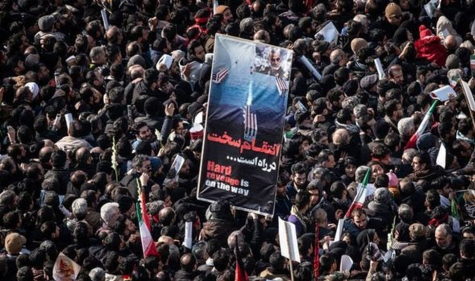The Iran Conflict – An Update
March 9, 2020
An anti-American poster being held up during a riot in Iran after the death of Gen. Qassem Soleimani. Photo courtesy of Daily Express.
On January 3rd, 2020, thousands of people in the United States held their breath as the news surfaced that a U.S. strike killed one of Iran’s top generals, Gen. Qassem Soleimani. Conflicts among the US and Iran have surfaced numerous times in previous years; however, killing a general who was considered the second highest power in the country, seemed to severely augment the problems between the two, and soon, the possibility of war seemed to be a dawning reality. Moreover, although it has been nearly two months since the issue, the fear that Iran will not strike back has not left people’s thoughts. Before you make any decisions on the outcomes of what may happen, it is important to know some background of how and why the issues between the US and Iran have escalated over time.
In essence, conflicts between the US and Iran initially began in the 1950s when Mohammad Mossadegh, the Iranian left-winged Prime Minister wanted to end all foreign relations of Iran, especially with its famous oil industry. This did not settle well with Britain, who, along with America, overthrew Mossadegh. Since this incident, things between the two have only escalated, which leads to our current issue.
The airstrike was issued by President Donald Trump in order to purposely kill Gen. Qassem Soleimani due to the harm he caused American citizens. Gen. Qassem Soleimani, in addition to being one of the most elite generals in Iran, was the head of the Quds Force which is Iran’s revolutionary military. Moreover, in the week leading up to the missile strike, Soleimani’s army was targeting Americans in northern Iran. Trump responded to this by saying that attacks against Americans would lead to a forceful comeback from America, and he followed through with his promise by events of January 3rd.
In the events that followed, Iran promised “severe revenge” against America and passed a bill which named US Armed Forces and The Pentagon as terrorists, and anyone aiding these American organizations would be considered as participating in a terrorist act. The answer to the question of whether or not killing Gen. Qassem Soleimani was the right decision, depends on who you ask, but in the meantime, we must wait to see the events of what is to come.













